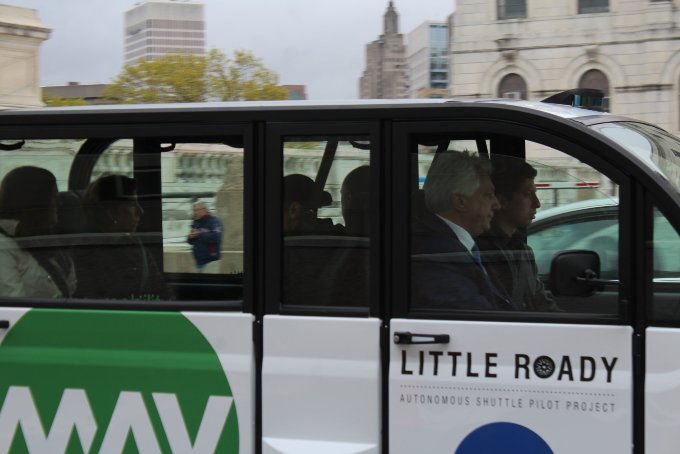
RIDOT KICKS OFF AUTONOMOUS VEHICLE PILOT PROJECT
«Little Roady Shuttle» to aid research on autonomous vehicle technology
Governor Gina Raimondo, Rhode Island Department of Transportation (RIDOT) Director Peter Alviti, Jr., along with state and local officials, today kicked off the Little Roady autonomous vehicle pilot project in Providence. This research project to evaluate autonomous mobility technology will go into service tomorrow, Wednesday, May 15.
The free service will be the focus of a research project to help the Department better understand the opportunities and challenges that come with integrating this new technology into RIDOT’s transportation planning. The research will help improve transit and provide information for communities, the workforce, and policymakers.
«It’s always exciting when Rhode Island has an opportunity to lead the way in cutting-edge green technology,» said Governor Gina Raimondo. «This project will provide valuable data for states across the country as we move beyond conventional transit services to provide better, cleaner, and more accessible transportation for all.»
This experimental service will operate seven days a week, from 6:30 a.m. to 6:30 p.m., with 12 stops between Olneyville Square and Providence Station. The Little Roady shuttles will run on a continuous, 5.3-mile loop on low-speed roads with an average wait time of about 10 minutes. Trip time will be about 20-25 minutes each way from Providence Station to Olneyville Square.
«The kickoff of this service and research project is another achievement for the new DOT,» RIDOT Director Alviti said. «Our transportation agency has literally been rebuilt to effectively deliver safer roads and bridges while simultaneously studying and piloting new technologies. In doing so, we’ll keep Rhode Island well ahead of the curve for the transportation solutions of tomorrow.»
The Little Roady shuttles are provided by May Mobility, Inc., which entered into a public-private partnership with RIDOT last fall, following a competitive request-for-proposals (RFP) process.
«By partnering with RIDOT, May Mobility is showing how our self-driving shuttles can be part of a sustainable future for communities,» said Edwin Olson, CEO and founder of May Mobility. «Our environmentally-friendly shuttles aren’t just fun-to-ride, they can increase access and convenience for a large number of people.»
The cost of the project, including the research component, is approximately $1.2 million. This includes funding for an $800,000 public-private partnership with May Mobility, a $500,000 grant awarded by the R.I. Attorney General’s Office as part of a settlement with Volkswagen, federal research funds through the Federal Highway Administration, and matching state funds. RIDOT’s contract with May Mobility includes options to extend the service for an additional two years.
The debut of the autonomous vehicles is the latest step in a multi-agency effort called the Rhode Island Transportation Innovation Partnership (TRIP), which RIDOT launched in 2017. TRIP also includes a research component, with the goal of studying autonomous mobility solutions, ridership, workforce impacts, environmental impacts, and technology adoption, among others.
TRIP includes many partner agencies and governmental entities, including the City of Providence, the Rhode Island Public Transit Authority (RIPTA), the Rhode Island Division of Motor Vehicles and the Quonset Development Corporation. The research team is made up of representatives from Brown University, 3×3 Design, Stae, and Bits and Atoms.
May Mobility, a Michigan-based startup, is developing self-driving shuttles for college campuses, corporate clients, and central business districts. It launched a private corporate service in Detroit in June 2018 and a public service in Columbus, Ohio in December 2018. It has also entered into an agreement for public service in Grand Rapids, Michigan. The company has hired fleet attendants and managers from Rhode Island and has set up a local operations office in Providence.
The shuttles use a suite of sensors – including some from Middletown-based KVH Industries – and intelligent software to help the vehicle understand its environment and how to safely navigate through it. The entire fleet has undergone 500 hours of testing both at Quonset Point this winter and in Providence this spring, which included detail mapping so the machines know every inch of its route and how to operate in a variety of traffic and weather conditions.
More information about the Little Roady project can be found at www.LittleRoady.com.

